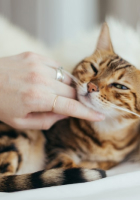There are few things more endearing than a little kitty achoo. We’ve never known a cat to sneeze like the horn of an oncoming freight train after all, although that’d be pretty hilarious.
Less funny is when your cat can’t stop sneezing. Is she OK? Why is my cat sneezing so much, and should I be concerned?
A cat sneezing fit shouldn’t be a constant occurrence, but it isn’t uncommon. Like humans, their noses are irritated by foreign objects and allergens. Here’s how to know when you should start taking cat sneezing seriously, and when you can just look on and say aww.
Reasons Why a Cat Is Sneezing
- They got hair or lint in their nose.
- They inhaled dust.
- There is an allergen in the air, such as pollen, perfume, smoke, or a chemical cleaning product.
- They have a cold (see below).
Cats: they’re just like us! They sneeze reflexively for the same reasons, and many of the same solutions apply.
- Groom kitty so that they don’t have so much hair flying around.
- Tidy up: Be sure to vacuum and dust, and consider taking a hair roller to things like blankets or cloth furniture.
- Machine up: If you’re very dedicated to your cat’s wellbeing, or have your own issues, set up an air purifier or humidifier (not a diffuser — the oil particulates in the air aren’t great for pets).
- Refrain from spraying things or cleaning vigorously if they’re in the vicinity and have shown sensitivity.
- “What if my cat keeps sneezing when she uses the bathroom?” Her litter might be throwing up a lot of dust! Considering changing to a less fine blend.
Do Cats Get Colds?

Yes, they certainly can. “My cat has a cold” is a valid concern, and one of the symptoms is sneezing.
But they cannot catch one from humans, so that’s not a concern. You can’t transfer germs to your cat by letting them sleep next to you when you’ve come down with something. You could sneeze into their face like a toddler, and all that would happen is they’d be angry. Likewise, your sneezing cat won’t spread any germs to you even if they are a little sick.
If a cat has a cold, it either:
- Recently got it from another cat — kennel environments (shelters or boarding) are a source of viruses as much as any elementary school
- Or contracted a virus previously and is having a flare-up due to a weakened immune system. That sounds serious but can be brought on simply by stress (separation anxiety, new home, a new animal in the house, etc.).
Cat colds are technically referred to as viral upper respiratory infections, which sounds much scarier than “a cold.” While looking into your cat’s sneezing, you may be spurred into action that’s ultimately unnecessary.
Respiratory infections caused by a feline calicivirus, for example, have no established treatment plan. Like the common cold, the virus must run its course while the patient gets plenty of rest, continues to eat, and keeps up the water intake.
If My Cat Keeps Sneezing, Does It Have a Cold?
A cat sneezing a lot over an extended period of time is one tip-off. Upper respiratory infections in cats usually last one to three weeks. Sneezing will likely be accompanied by:
- Runny eyes and nose
- A little lethargy
- An infrequent cough
- Potentially a low fever, which can only be verified by taking their temperature (between 100.4 and 102.5 degrees Fahrenheit is normal range)
But remember, a cold in itself — even when it is properly called a feline upper respiratory infection — is not cause for alarm UNLESS:
- It is your kitten sneezing and with watery eyes, especially if they have green or yellow discharge. Kittens are susceptible to worsening symptoms and should be taken to a vet to be checked on as soon as possible as a precaution.
- Similarly, if it’s your elderly cat with sneezing and discharge, you should take them to the vet. Cats three and up usually have very mild cold symptoms, but older cats, like kittens, could be susceptible to secondary bacterial infections or other problems. Take them to the vet to be safe.
- Your cat is sneezing blood. A distressing sight that you’d probably jump into action over anyway, it could indicate a serious problem.
- You take a temperature reading, and your cat has a high fever. As with humans, this is a sign of immune distress and indicates a more-than-mild reaction.
- Your cat won’t eat, or you don’t see them drinking, or they’ve fallen into extreme lethargy. If you can’t persuade them to partake with wet food or a little tuna or what have you, you’ll have to bring them in for veterinary intervention before things begin to get worse.
How to Treat a Cat Cold

In one of the more troubling scenarios cited above, a vet can prescribe antibiotics, administer an IV, run some tests. As we also mentioned, however, some mild upper respiratory infections won’t necessarily benefit from antibiotics and the like.
For humans and cats alike, the best we can do for a common cold is to treat the symptoms, not the root cause.
- The humidifier idea is great to help with general congestion and ease breathing. Emulate the effect by running hot water in the shower or kitchen sink, to produce steam and add moisture to the air where your sick kitty is hanging out.
- Head to the pet store and get them an over-the-counter supplement like lysine, which offers immune support.
- Keep their eyes and nose clean with a warm, damp cloth.
- Offer them fresh, cool water directly, such as in a shallow dish or little cup. Some cats love to feel like they’re part of a special human club that doesn’t drink out of a bowl on the ground. Aside from that, make sure clean water is always readily available.
Takeaway
“Huh, my cat is sneezing. Oh boy, that’s a lot of sneezes.”
If that’s all your cat is doing differently, wait at least a few days to monitor frequency. Sneezing, in itself, is no big deal. It just requires a little examination of the cause and then an adjustment to accommodate kitty.
If it keeps happening, your cat may have a cold, but even that’s usually a run of the mill problem that will work itself out.
True causes for concern are the same as ever: dehydration, not eating, not moving, and too much discharge that isn’t clear. These are not regular cat cold symptoms (such as watery eyes and runny nose) and require a trip to the vet ASAP.
Otherwise, just keep your cats home from kitty school, and let them rest it off.











